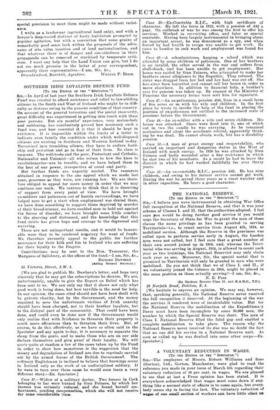THE NATIONAL RESERVE.
(To THE EDITOR OF THE " SPECTATOR.")
believe you were instrumental in obtaining War Office full recognition of the National Reserve, and that it was your scheme of Classes I. and II. that the authorities adopted. I feel sure you would be doing further good service if you would urge the Secretary of State for War to grant the men of these classes the same privilege as has been granted to serving Territorials—i.e., to count service from August 4th, 1914, as mobilized service. Although the Reserve in the provinces was called upon to perform service early in August, the London men were not called, but I feel sure that a great number of their own accord joined up in 1914, and, whereas the Terri- torial who was serving in August, 1914, is allowed to count each year as two trainings, the National Reservist may only claim each year as one. Moreover, Sir, the special medal that is promised to Territorials will only be granted to men who were mobilized. Do you not think that we of Class I. and II., if we voluntarily joined the Colours in 1914, might be placed in the same position as those actually serving?—I am, Sir, &c.,
N. E. PAGE
(Ea Hackney Reserve Clam II. and I'S.). 29 Norfolk Road, Dalston, E. 8.
[We hesitate to express an opinion. We may say, however, that, speaking generally, the National Reserve never received the full recognition it deserved. At the beginning of the war the services it rendered were of incalculable value. But for the National Reserve the mobilization of the Expeditionary Force must have been incomplete by some 30,000 men, the number by which the Special Reserve was short. The men of Class I. National Reserve filled the fatal gap and enabled a complete mobilization to take place. The reason why the National Reserve never received its due was no doubt the fact that no one did his service in a National Reserve unit. As soon as called up he was drafted into some other corps.—ED. Spectator.]


































 Previous page
Previous page